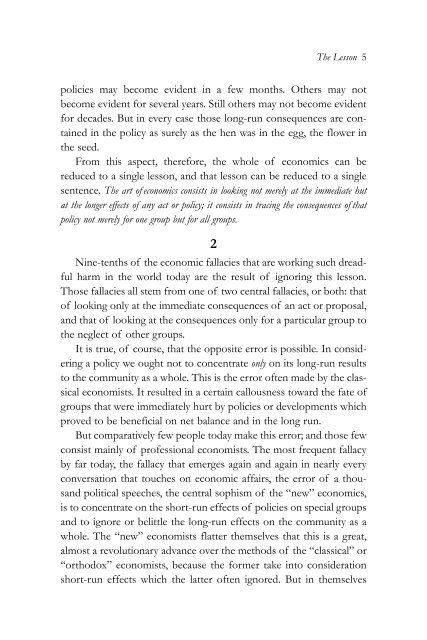1gDdM7w
1gDdM7w
1gDdM7w
- No tags were found...
Create successful ePaper yourself
Turn your PDF publications into a flip-book with our unique Google optimized e-Paper software.
The Lesson 5policies may become evident in a few months. Others may notbecome evident for several years. Still others may not become evidentfor decades. But in every case those long-run consequences are containedin the policy as surely as the hen was in the egg, the flower inthe seed.From this aspect, therefore, the whole of economics can bereduced to a single lesson, and that lesson can be reduced to a singlesentence. The art of economics consists in looking not merely at the immediate hutat the longer effects of any act or policy; it consists in tracing the consequences of thatpolicy not merely for one group but for all groups.2Nine-tenths of the economic fallacies that are working such dreadfulharm in the world today are the result of ignoring this lesson.Those fallacies all stem from one of two central fallacies, or both: thatof looking only at the immediate consequences of an act or proposal,and that of looking at the consequences only for a particular group tothe neglect of other groups.It is true, of course, that the opposite error is possible. In consideringa policy we ought not to concentrate only on its long-run resultsto the community as a whole. This is the error often made by the classicaleconomists. It resulted in a certain callousness toward the fate ofgroups that were immediately hurt by policies or developments whichproved to be beneficial on net balance and in the long run.But comparatively few people today make this error; and those fewconsist mainly of professional economists. The most frequent fallacyby far today, the fallacy that emerges again and again in nearly everyconversation that touches on economic affairs, the error of a thousandpolitical speeches, the central sophism of the “new” economics,is to concentrate on the short-run effects of policies on special groupsand to ignore or belittle the long-run effects on the community as awhole. The “new” economists flatter themselves that this is a great,almost a revolutionary advance over the methods of the “classical” or“orthodox” economists, because the former take into considerationshort-run effects which the latter often ignored. But in themselves


